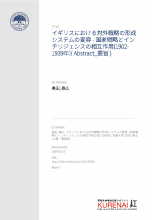6 0 0 0 OA イギリスにおける情報重視の戦略文化
- 著者
- 奥田 泰広
- 出版者
- 財団法人 日本国際政治学会
- 雑誌
- 国際政治 (ISSN:04542215)
- 巻号頁・発行日
- vol.2012, no.167, pp.167_130-143, 2012-01-30 (Released:2013-09-21)
- 参考文献数
- 71
This paper examines the ‘strategic culture’ of Britain, which gives importance to external intelligence activities prior to the formulation of the foreign policy. ‘Intelligence’ is sometimes narrowly defined as the activity of collecting information covertly. However, in this paper, the word ‘intelligence’ has a broader definition; it is defined as the state's activity to investigate the international environment. In history, some countries formed their foreign policies without considering the broader definition of ‘intelligence’ and subsequently encountered defeat in wars. Britain has managed to avoid serious defeats in wars owing to its intelligence-oriented strategic culture.Such a feature can be seen in the case of Britain's intelligence activity prior to the First Word War. From the late nineteenth century to the eve of the First World War, Britain conducted some important activities to investigate the international environment. While adversary relationships were hardening within Europe, the Admiralty and War Offices tried to comprehend the entire picture of the international crisis and began to clarify the ‘emergency powers’ of the government. In addition, in the process of doing so, both offices decided to reinforce their own intelligence services. Furthermore, concerns regarding both offices were shared by the higher stratum of the strategic decision-making authority—the Committee of Imperial Defence (CID) —. Further, the establishment of a new intelligence service—Secret Service Bureau—was determined by the CID in 1909; this service later became MI5 and SIS as we know them today.Subsequently, in 1911, the ‘War Book’ was compiled with the cooperation of many departments such as the Foreign, Admiralty, and War Offices. Although the War Book did not describe detailed plans for the war, Britain could avoid internal confusions at the onset of the war owing to the War Book. The important point here is that the officials of the Naval and Military intelligence departments attended the meeting for the compilation of the War Book held among the officials from the other offices of the government. The War Book can be regarded as representative of the intelligenceoriented strategic culture of Britain.From a common perspective, the broader definition of ‘intelligence’ should be highly valued before making any decision. However, in reality, many countries have not conducted such policy-related activities. This paper considers the activities of the British intelligence prior to the First World War as a salient example of an ‘intelligence-oriented strategic culture’ and discusses this case in depth.
1 0 0 0 OA 占領期日本と英連邦軍--イギリス部隊の撤退政策を中心に
- 著者
- 奥田 泰広
- 出版者
- 愛知県立大学外国語学部
- 雑誌
- 紀要.地域研究・国際学編 = Journal of the Faculty of Foreign Studies, Aichi Prefectural University: Area Studies and International Relations (ISSN:13420992)
- 巻号頁・発行日
- no.52, pp.1-20, 2020-03-24
1 0 0 0 OA イギリスにおける情報組織オーバーサイトに関する一考察
- 著者
- 奥田 泰広
- 出版者
- 国際安全保障学会
- 雑誌
- 国際安全保障 (ISSN:13467573)
- 巻号頁・発行日
- vol.36, no.3, pp.75-92, 2008-12-31 (Released:2022-04-20)
1 0 0 0 OA 「デルカッセ外交」の再検討 ―民主主義国における大戦略の一例として―
- 著者
- 奥田 泰広
- 出版者
- 国際安全保障学会
- 雑誌
- 国際安全保障 (ISSN:13467573)
- 巻号頁・発行日
- vol.33, no.2, pp.29-47, 2005-09-30 (Released:2022-04-24)
1 0 0 0 IR 占領期日本におけるイギリスの広報政策 : 外務省情報政策局の活動(1947年)
- 著者
- 奥田 泰広
- 出版者
- 愛知県立大学大学院国際文化研究科
- 雑誌
- 愛知県立大学大学院国際文化研究科論集 = Bulletin of the Graduate School of International Cultural Studies Aichi Prefectural University (ISSN:13454579)
- 巻号頁・発行日
- no.21, pp.107-126, 2020
- 著者
- 奥田 泰広
- 出版者
- 情報史研究会
- 雑誌
- 情報史研究 = Review of intelligence history (ISSN:18838685)
- 巻号頁・発行日
- no.9, pp.1-26, 2018-12


